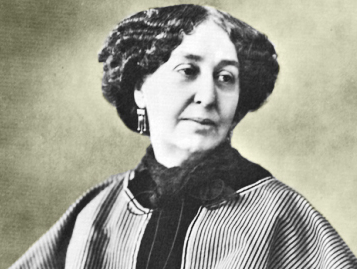
George Sand and Gustave Flaubert differed markedly in both personal disposition and belief. Sand, the ever-impetuous, considered ideas or archetypes in abstract forms. Flaubert recorded his observations, describing the icy Seine in midwinter, or complaining of the mutual futility and necessity of quotidian habits. At the time of this letter’s writing, Sand, at seventy years of age, suffered from poor health; she would come to die only a year later. Nevertheless she answers Flaubert’s lament with her own consolation.
To M. Gustave Flaubert, Croisset.
Nohant, 16th January, 1875
I also, dear friend, kiss you at the beginning of this year and wish that you may find it tolerable, since you will not hear any more of the myth happiness. You admire my serenity; it does not proceed from myself, but from the necessity I experience of thinking of others. I have scarcely the time to do so; old age moves on, and death is pushing me by the shoulders.
I am still, if not necessary, at least extremely useful to my family; and so long as any life is left to me, I will continue to think, speak and toil for them.
Duty is the master of masters, it is the real Zeus of modern times; the Son of Time, it has become its master. It lives and acts, indifferent to all the agitations of this world. It neither reasons nor discusses. It examines everything fear-lessly; it pursues its course without lookingback. Stupid Chronos used to swallow stones; Zeus breaks them with thunder, that is, with its will. I am not, therefore, a philosopher, I am the servant of Zeus, who deprives the slave of one-half of his spirit, but leaves intact that of the brave man.
I have no more leisure for thinking of myself, dreaming of disheartening things, despairing of mankind, meditating over my past joys and griefs, and summoning death.
Of course! If we were selfish, we should welcome him; it must be nice to sleep in oblivion or wake up to a better life! For such are the two hypotheses, or rather the antithesis, which death opens to us.
But he, who still has his task to perform, must not invoke death before the moment when the exhaustion of our bodies will fit us for crossing the gates of the true abode of liberty. You feel the want of having children of your own. That is the punishment of those who wish to be independent; yet the regret you express is still a glory for those who devote themselves to Apollo. Do not, therefore, complain of having to toil much and depict your martyrdom to us; there is matter in this for a fine work.
Renan, you say, is despairing; I do not believe it. My opinion is that he is grieved, like all those whose views are lofty and far-reaching; but his powers ought to be proportioned to his views. Jerome Napoleon shares his ideas; he does well if he shares them all. He wrote to me a very wise and kind letter. He now considers relative salvation to be in a moderate Republic; as for me, I still believe in its possibility. It will be very bourgeois, and not at all ideal, but we must indeed begin at the beginning. We artists have no patience. We want the abbaye de Theleme there and then; but, before saying, “Do what you please!” we shall have to conform to the “Do what you can!”
I love and embrace you cordially. My children, big and small, join with me.
FURTHER READING
The beginning of an impossible friendship.
Ernan Renan’s disillusionment.
The Napoleon’s muddled family dynamics, and further considerations of republicanism.


